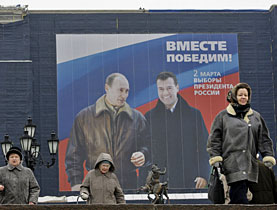
Observers worried by Russia poll fairness

As Dmitry Medvedev headed for victory in the Russian presidential election on Sunday, election observers noted a certain number of irregularities.
Swiss parliamentarian Andreas Gross, head of the Council of Europe’s monitoring mission, is due to present his report on Monday, and will not comment until then. He spent election day listening to people in the field and monitoring the voting.
However, one monitor told Reuters news agency that voters’ ballots had been visible to election officials in three polling stations he had visited.
An independent Russian organisation, Golos, told the agency it had seen evidence of fraud all over the country.
First exit polls on Sunday evening gave Medvedev, currently Russia’s first deputy prime minister, and the candidate favoured by outgoing president, Vladimir Putin, nearly 70 per cent of the vote.
Pre-election concern
The run-up to the election had already aroused concern.
Following a two-day pre-electoral trip to Moscow in February, the Council of Europe mission highlighted the limited number of candidates.
In addition to Medvedev, three other men were in the running to take over from Putin, who is stepping down at the end of two four-year terms. But Medvedev was always widely expected to win.
“It is much too difficult to be a candidate in Russia and the obstacles are too high. This was done on purpose by legislative reforms which limit access to political power,” Gross told swissinfo ahead of his current trip to Russia.
Coverage of Medvedev has also dominated prime time television – the key to reaching the population, added Gross.
No OSCE
The 25-member observer mission from the Parliamentary Assembly of the Council of Europe has been in Russia since Wednesday.
It is the only group of European election monitors in the country. The Organization for Security and Cooperation in Europe (OSCE) decided against sending its observers last month, citing too many restrictions by Moscow. Russia has called the move “unacceptable”.
Gross said that the OSCE’s work normally formed the basis of his team’s short-term work.
“But in these elections the long term is so easy to understand that we will be able to fulfil our task even though the OSCE’s observers won’t be there,” he said.
Others will be present, explained Gross. “We are the only observers with a democratic standard because the other ones come from China or from former Soviet Union countries that are not so reliable when it comes to democracy,” he said
Gross, a member of the centre-left Social Democratic Party, has carried out 45 election observations in the past 12 years, including the Russian parliamentary poll last December, which was declared unfair by European monitors.
Foregone conclusion?
Polls suggested that there would not be much doubt about the winner.
“[One] showed that 80 per cent of the Russian people were ready to accept the man Putin chooses as his successor. This is quite extraordinary because the logic of a term limit is that you have to reshuffle the political power redistribution,” said Gross.
On the other hand, Gross told swissinfo, credit had to be given to Putin for not changing the Russian constitution to allow him a third term as president. This would have been possible because he has a constitutional majority in parliament.
Putin also did not choose a hardliner, but the more moderate and “civilised” Medvedev, Gross said.
“But on the other hand the fact that the majority of people is ready to choose who Putin proposes shows the real problem of the development of democratic mentality in a society,” warned the Swiss parliamentarian.
“This problem was increased by the legislation which prevented, for instance, the former Prime Minister [Mikhail Kasyanov] from being a candidate in order to be real competition for Putin’s choice and to give the people a choice,” added Gross.
swissinfo, Isobel Leybold-Johnson
The presidential elections, for Russia’s third president since the collapse of the Soviet Union, took place on Sunday.
Standing against First Deputy Prime Minister Dmitry Medvedev were Communist party leader Gennady Zyuganov, Liberal Democratic Party leader Vladimir Zhirinovsky – both political veterans – and Andrei Bogdanov, the little known leader of the Democratic Party of Russia. None of Russia’s liberal opposition parties has a candidate in the race.
Around 300 international observers were monitoring the vote, according to Russia’s Central Electoral Commission. The Council of Europe’s mission will present its preliminary conclusions on Monday.
A number of Swiss were drawn to Russia in the 18th century in the wake of the modernisation policies of Peter the Great. In particular they worked as architects and scientists.
In the 19th century Russia was one of the guarantors of permanent Swiss neutrality, making a significant contribution to the formulation of the Swiss political system. One famous Russian emigrant to live in Switzerland last century was Lenin.
Switzerland opened a consulate in St Petersburg in 1816, upgrading to a legation 90 years later. The two countries broke off diplomatic relations in 1923 when Russia was going through a period of revolutionary turmoil. They were resumed in 1946.
Since the end of the Cold War contacts have become closer in the political, economic and scientific fields. Switzerland is one of the most important foreign investors in Russia.

In compliance with the JTI standards
More: SWI swissinfo.ch certified by the Journalism Trust Initiative




























You can find an overview of ongoing debates with our journalists here . Please join us!
If you want to start a conversation about a topic raised in this article or want to report factual errors, email us at english@swissinfo.ch.